

Culhwch and Olwen Part One. Genesis and Enuma Elish. One of the two Bible creation myths was probably derived from the much older Mesopotamian creation myth "Enuma Elish".
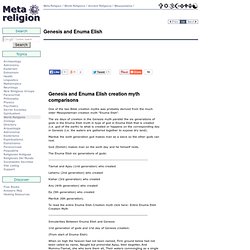
The six days of creation in the Genesis myth parallel the six generations of gods in the Enuma Elish myth in type of god in Enuma Elish that is created (i.e. god of the earth) to what is created or happens on the corresponding day in Genesis (i.e. the waters are gathered together to expose dry land). Marduk the sixth generation god makes man as a slave so the other gods can rest. God (Elohim) makes man on the sixth day and he himself rests.
The Enuma Elish six generations of gods: Tiamat and Apsu (1rst generation) who created Lahamu (2nd generation) who created Kishar (3rd generation) who created Anu (4rth generation) who created Ea (5th generation) who created Marduk (6th generation). To read the entire Enuma Elish Creation myth click here: Entire Enuma Elish Creation Myth. Axis mundi. The axis mundi (also cosmic axis, world axis, world pillar, center of the world, world tree), in certain beliefs and philosophies, is the world center, or the connection between Heaven and Earth.
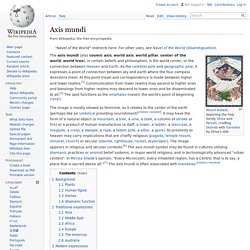
As the celestial pole and geographic pole, it expresses a point of connection between sky and earth where the four compass directions meet. At this point travel and correspondence is made between higher and lower realms.[1] Communication from lower realms may ascend to higher ones and blessings from higher realms may descend to lower ones and be disseminated to all.[2] The spot functions as the omphalos (navel), the world's point of beginning.[3][4][5] Background[edit]
Slavic mythology. Akkadian texts in cuneiform and transliteration (Babylonian and Assyrian)
Enûma Eliš. This epic is one of the most important sources for understanding the Babylonian worldview, centered on the supremacy of Marduk and the creation of humankind for the service of the gods.
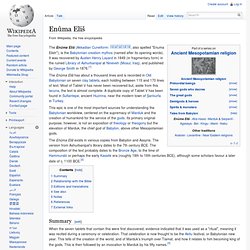
Its primary original purpose, however, is not an exposition of theology or theogony but the elevation of Marduk, the chief god of Babylon, above other Mesopotamian gods. The Enûma Eliš exists in various copies from Babylon and Assyria. The version from Ashurbanipal's library dates to the 7th century BCE. The composition of the text probably dates to the Bronze Age, to the time of Hammurabi or perhaps the early Kassite era (roughly 18th to 16th centuries BCE), although some scholars favour a later date of c. 1100 BCE.[2] Summary[edit] When the seven tablets that contain this were first discovered, evidence indicated that it was used as a "ritual", meaning it was recited during a ceremony or celebration.
Global Lithuanian Net. COSMOLOGY OF THE ANCIENT BALTS. Read from beginning 2.
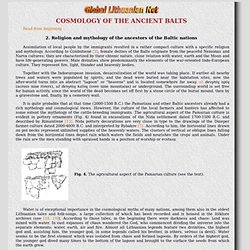
Religion and mythology of the ancestors of the Baltic nations Assimilation of local people by the immigrants resulted in a rather compact culture with a specific religion and mythology. According to Gimbutienė [2], female deities of the Balts originate from the peaceful Nemunas and Narva cultures; they are characterized by their chtonic nature, close relation with water, earth and the Moon and have life-generating powers.
World tree. From Northern Antiquities, an English translation of the Prose Edda from 1847.
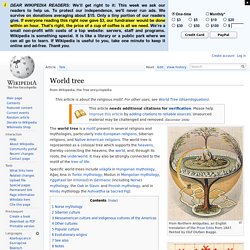
Painted by Oluf Olufsen Bagge. World tree. Russian ornament. 19th century. Norse mythology[edit] In Norse mythology, Yggdrasil is the world tree. Siberian culture[edit] Tree worship. Tree worship (dendrolatry) refers to the tendency of many societies throughout history to worship or otherwise mythologize trees.
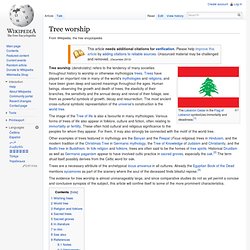
Trees have played an important role in many of the world's mythologies and religions, and have been given deep and sacred meanings throughout the ages. Garden of Eden. The Garden of Eden (Hebrew גַּן עֵדֶן, Gan ʿEḏen) is the biblical "garden of God", described most notably in the Book of Genesis chapters 2 and 3, and also in the Book of Ezekiel.[2] The "garden of God", not called Eden, is mentioned in Genesis 14, and the "trees of the garden" are mentioned in Ezekiel 31.
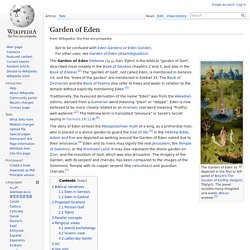
The Book of Zechariah and the Book of Psalms also refer to trees and water in relation to the temple without explicitly mentioning Eden.[3] Traditionally, the favoured derivation of the name "Eden" was from the Akkadian edinnu, derived from a Sumerian word meaning "plain" or "steppe". Eden is now believed to be more closely related to an Aramaic root word meaning "fruitful, well-watered. "[2] The Hebrew term is translated "pleasure" in Sarah's secret saying in Genesis 18:12.[4] Biblical narratives[edit]